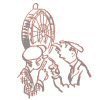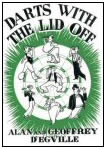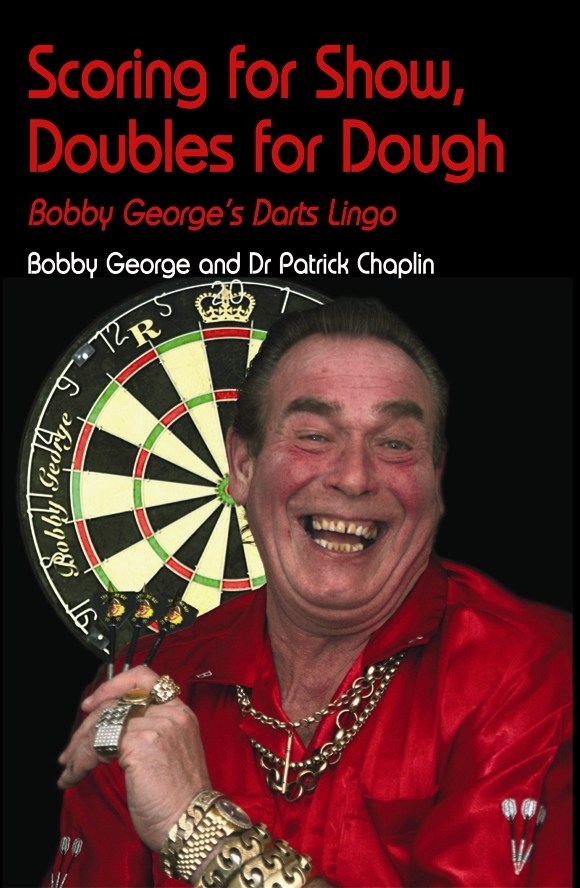
‘The man who cannot speak the lingo of the dart is nowadays an outcast’
Alan and Geoffrey D’Egville (Darts with the Lid Off (1938))
In July 2004 I received an e-mail from Micha Hofri who, whilst stating that my site was ‘a joy to read’, said it lacked that certain something for those just beginning to play darts; that something being an explanation of the terms used in darts. To an extent this criticism has been answered by the introduction of the section ‘How to play darts’ which makes clear what words such as ‘oche’ mean. In fact the word ‘oche’ also has a section of its own on the site, but Micha is right, I do need to bring folks’ attention to other expressions which can cause confusion ‘on the oche’. To expand Micha’s suggestion further, this article will also include explanations of some of the more common and the much more scarce words and phrases that are being – or have been – utilised in darts over the years.
As darts became more popular in Britain during the second and third decades of the twentieth century, it began to develop a language all of its own. By the time Rupert Croft-Cooke’s book Darts was published in 1936 he was able to provide a glossary of in excess of fifty terms and phrases used by dart players which he deemed to be ‘the most universal.’ However, he did point out that ‘every district has its own words’. However, Croft-Cooke took little or no interest in the origins of the expressions he recorded.

The D’Egville’s, quoted at the beginning of this article, published a glossary of in excess of eighty words and phrases in 1938, many of which were drawn from Croft-Cooke’s earlier work whilst others appeared for the first time.
When Croft-Cooke’s book was reviewed in the Times Literary Supplement the reviewer described the listing of these words and phrases common to the game of darts as ‘enthralling local history’. What distinguishes the private language of darts from that of other sports and games is that much of the idiom is parochial in nature and often reflects directly the working-class roots of the game.
In this article a selection of the words, terms and phrases listed by Croft-Cooke are quoted and then examined; Croft-Cooke’s definitions being compared with those revealed by my research.
‘BAG O’ NUTS – The number 45. I have heard this term in Berkshire, but it may be used more widely.’
The term was used more widely, ‘Bag o’ Nuts’ being a common phrase used in darts in various parts of England. It has its origins in the fairground where a score of 45 on the darts stall in the 1930s would win the customer a bag of nuts. As times changed, the prize changed and when goldfish replaced the bag of nuts a score of 45 at darts led to the introduction of the phrase ‘Fish and globe’.
‘BULL CALF – A Gloucestershire expression indicating the number 33.’
For good reason Croft-Cooke kept his definition of this expression to a simple sentence. In a 1936 publication it is unlikely that he would have wished – or been allowed – to go into any greater detail on the subject.
In the 1980s the phrase ‘Bull Calf’ was still being used in Gloucestershire and most certainly in the Forest of Dean. The derivation relates to the method of discovering whether a calf, which is about to be delivered, is a bull or not – by touch. The number 33 when rotated through 90° in a clockwise direction would be a visual representation of that process.
‘CAT’S ON THE COUNTER – Means that the game is won and that the winners are ardently expecting the losers to invite them to have a drink.’
This has nothing whatsoever to do with any feline resident of the public bar but everything to do with the early pub. During the nineteenth century ‘Cat’ and ‘kitten’ were sizes of drinking vessel, the ‘cat’ being a quart pot and the ‘kitten’ either a pint or half pint pot. The game of darts is traditionally played for a drink and this is a cry from the victors to the vanquished that it is time their glasses were filled.
‘CONNAUGHT RANGERS – The number 88. Military historians may know why this should be – I do not.’
The D’Egvilles added ‘Territorial number of Connaught Rangers.’ This link with the number 88 originates from the 88th (Connaught Rangers) Regiment of Foot which bore the title from 1793 to 1881. In 1881 the regiment was linked to the 94th Regiment of Foot to form the Connaught Rangers. After distinguished service in both the Boer War and the Great War the regiment was disbanded, in common with other Southern Irish regiments, on 31 July 1922, following the establishment of the Irish Free State.
‘FEATHERS – One of the innumerable synonyms for the number 33. Its origin is the Cockney saying: “Thirty-three thousand feathers on a thrushes throat” or rather – in dialect – “Firty-free fousand fevvers on a frush’s froat,”’
Innumerable words and phrases of Cockney rhyming slang are utilised in the language of darts, including ‘Two Bee-Hives’ (two fives), ‘Two Hens (two tens) and ‘Plenty Too’ (twenty-two). Given that the centre of the dartboard manufacturing industry in the 1930s was the East End of London it is not surprising that rhyming slang should find its way into the game of darts. However, the true origins of this particular phrase attributed to Cockneys about the ‘froat’ of a ‘frush’– which appears to be mocking the Cockney accent – remain a mystery.
‘LEVEL PEGS – When the score of each side is equal there is no quibbling about so many each, or so much all. “Level pegs” is said, tersely, to be the state of things.’
When darts was first played in public houses as a game of 101, 301, or 501, rather than simply throwing darts at a small concentric circle, the scoring was undertaken on a board originally used to score the card game of cribbage. The cribbage board, also utilised in the pub game of dominoes, scored by the movement of pegs around the board pegging the score by the number of holes. When the scores were level, the pegs were level, so if anyone wanted to know or comment on the score it would be ‘level pegging’ or ‘level pegs’.
‘LORD NELSON – This means the number 111 – the three ones. The origin is one eye, one arm…but really some of these terms need not be too fully investigated.’
Of this expression the D’Egville’s wrote ‘The origin of this is that our national hero boasted one arm, one eye, and – well, perhaps after all you’d better ask Joe Flukes.’ Never actually hinting at the remaining ‘one’, T. H. White, who picked up the phrase in Gloucestershire, recorded ‘111 is known as Nelson, for a delightful reason that is unfortunately unprintable.’ In 1946 the complete phrase was still not revealed as Moore gave the meaning as ‘one eye, one arm, and one (let us say) ambition.’
The missing ‘one’ was – apparently – ‘one testicle’. It is hardly surprising then that this was not revealed to readers in 1936.
‘LORD SHERBORNE – An expression used only in the Cotswolds, denoting the number 33. I have been told in the district that it owes its origin to the fact that Lord Sherborne for many years drove a car with the index number 33. The car is no more, but like Tom Pearce’s Grey Mare it appears “gashy white” whenever that irritating number is required for a finish.’
Lord Sherborne, at the time of the publication of Darts, was James Huntley Dutton, 6th Baron Sherborne (1873-1949) who had succeeded his uncle in 1920. The family seat was Sherborne Park, near Northleach in Gloucestershire. Many of the locals would have worked the land on Lord Sherborne’s and it is therefore not surprising that he would feature in the local language of darts. It is likely that Lord Sherborne had been one of the first car owners in the area.
‘MARRIED MAN’S SIDE – The area round the left of the board, where the numbers are of a high average. An uncertain player who has been trying to score on the 20, and only getting the 1 or the 5, may be advised to go “on the married man’s side.” Here, with the 16, 8, 11, 14, 9 and 12 to play on he is not likely to get less than 30, though it is no place for really outstanding totals.’
The one point of definition omitted by Croft-Cooke is why that side really was called the ‘married man’s side’. The D’Egville’s hinted at the explanation by referring to ‘The “safety first” side of the board.’ The phrase is more a reference to extra-marital activities than the institution of marriage. The married man ‘always plays safe’.
‘UP IN ANNIE’S ROOM – Means that you now need the double 1, which is, of course, near the top of the board. I don’t know who Annie may have been – I like to think of her as a dignified barmaid of the Edwardian era with a mountain of chestnut hair and a passion for darts. Perhaps – who can tell? – she kept a dart-board in her bedroom on the top floor, and practised assiduously. At any rate, she has been immortalised by this almost universal expression.’
The earliest examples of the use of the phrase ‘(Up) in Annie’s Room’ located by the Oxford University Press come from the time of the First World War. The phrase was ‘an answer to questions as to the whereabouts of someone who cannot be found.’ When asked where a soldier was the reply would be “He’s up in Annie’s Room.” This implies that he was not where he should have been and even that he was ‘a bit of a lad’. Thus it would have been easy for this light-hearted Services’ slang to cross over into the language of darts to mean the double 1, a place where the darter is not supposed to be, i.e. he should have finished his game much earlier.
‘WEAVERS DONKEY – The number 42, a Berkshire term.’
Croft-Cooke may have noted down this expression incorrectly, as the proper term is ‘Weavers Dobbie’. Alternatively ‘Weaver’s Donkey’ may be a local corruption of the correct phrase. A ‘dobbie’ is ‘a small…attachment to a loom for weaving small figures’. Dobbies were used on looms ‘to increase the warp figuring capacity by up to 48 shafts.’ It might well be that the type of dobbie used in Berkshire was for 42 shafts. This connection with the textile industry of Berkshire is interesting in terms of the actual longevity of darts which may have existed in that area longer than previously imagined. The Berkshire textile industry – with Reading as its centre – virtually died out in the eighteenth century. Alternatively the phrase may have been passed to darts via some other pastime or general usage.
Whilst travelling through Gloucestershire in the 1930s T. H. White collected a number of words and phrases utilised by dart players. He recorded a score of 81 being greeted with a call of ‘Snowstorm’ because there was apparently a blizzard in the area in 1881, whilst ‘While-Shepherds-Watched’ meant 62 ‘because the hymn of that name is numbered thus in the local hymn-book’.
Much of the language of darts has its origins quite naturally in the ribald language of the public bar or vault. ‘Lord Nelson’ and ‘Up in Annie’s Room’ are clear examples, as is ‘Euston Road’, quoted by the D’Egvilles as meaning ‘Two fours’ and who wrote ‘We know why, but you must ask someone else.’ Again the phrase has its roots in Cockney rhyming slang – two whores, two fours – Euston Road being where they plied their trade.
In addition the links with the fairground, a major cause of the spread of the popularity of darts during the nineteenth and early twentieth centuries can be evidenced through expressions such as ‘Bag o’ nuts’ and ‘Fish and globe’ and also ‘Cup and Saucer’, another prize given at fairs and fetes. One extreme of the latter appears in a work by H. G. Wells where, at a village fete
‘Teddy and Letty and Cissie and Hugh were developing a quite disconcerting skill at the dart-throwing, and were bent upon compiling a complete tea-set for the Teddy cottage out of their ‘winnings’.’
The language of darts also has links with the ‘lingo’ of bingo, otherwise known as the army game of ‘house’ or ‘housey-housey’. These include ‘clickety-click’ (66), but, as the origins of the game of ‘house’ may themselves lie in an early form of darts game played in fairgrounds, it would be unreasonable to make any firm assumptions in this respect until that avenue of research is properly investigated and the outcome known.
Many of the terms are ‘enthralling local history’, one further example being ‘Lumbs’ a word only used by dart players in the neighbourhood of Hornsey, North London when they needed double 11 for game. Mr. Lumbs was the pawnbroker who operated from 11, High Street, Hornsey and would have been well known to the working-class population of the area.
Although ‘Connaught Rangers’ as part of the idiom of darts could have had its origins in the early part of the twentieth century, ‘Cat’s on the Counter’ is definitely nineteenth century. Further research is necessary to identify whether this is truly an original darts term or a generic one passed on to it from another pub game such as dominoes or cribbage, i.e. that it was already a term in general usage for ‘There’s the bar. Losers pay.’
The language of darts developed from a myriad of sources. Many words and phrases were inherited, others original or hybrids, but all reflected to a lesser or greater extent the working class roots of the game, be it a rather lewd reference to a national hero or a hidden local reference to the sexing of calves. According to Croft-Cooke, by the mid-1930s, when the game of darts was reaching the height of its popularity, there were over fifty words and phrases in common usage, many of which survive today.
In 1989 an eminent sports historian wrote that ‘Darts is a good example of the power of popular culture creating a private language for players.’

In 2011 darts professional Bobby George and I published Scoring for Show, Doubles for Dough – Bobby George’s Darts Lingo being a hilarious, comprehensive guide to the language of darts. Sadly this is now out of print and copies on the ‘net are offered up for very silly money!
© Patrick Chaplin 2007 (Updated August 2019)
